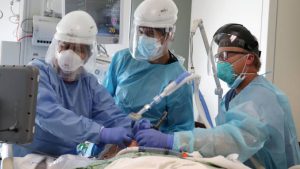
Some Artificial intelligence researchers at Facebook have laid claims to the development of a software that foresees the possibility of the health of a Covid patient deteriorating or the patient requiring oxygen based on the X-rays done on their chests.
Facebook, in conjunction with academics at NYU Langone Health’s predictive analysis unit and department of radiology on the research stated that the software could assist doctors in the avoidance of dismissing at-risk patients too early, and also aiding hospitals in the planning for oxygen demand.
The five researchers from Facebook AI Research and the other five from the NYU School of Medicine said they developed three machine learning models that are all a little bit different.
One of these models attempts to predict patient deterioration based on just one X-ray. Another does the same with a sequence of X-rays. The third uses a single X-ray to determine how much supplemental oxygen a patient might need.
‘Our model using sequential chest X-rays can predict up to four days (96 hours) in advance if a patient may need more intensive care solutions, generally outperforming predictions buy human experts’, said the authors in a blog post.
William Moore, a Professor of Radiology at NYU Langone Health said in a statement: ‘We have been able to show that with the use of this AI algorithm, serial chest radiographs can predict the need for escalation of care in patients with COVID-19’.
He added, ‘As COVID-19 continues to be a major public health issue, the ability to predict a patient’s need for elevation of care― for example, ICU admission― will be essential for hospitals’.
To enable the AI system learn how to make predictions, it was fed two datasets of non-Covid patient chest X-rays and a dataset of 26,838 chest X-rays from 4,914 Covid patients.
The researchers stated that they used an AI technique called ‘momentum contrast’ to train the neural network to extract information from chest X-ray images. A neural network is a computing system inspired by the human brain that is capable of spotting patterns and identifying relationships between vast amounts of data.
Experts have questioned how effective the AI software can be in real-time.
‘From a machine learning perspective, one would need to study how well this translates to new, unseen data from different hospitals and patient populations’, said Ben Glocker, who researches machine learning for imaging at Imperial College London, via email. ‘From my skim reading, it appears that all data (training and testing) is coming from the same hospital’.
The Facebook and NYU researchers said ‘These models are not products, but rather research solutions, intended to help hospitals in the days and months to come with resource planning. While hospitals have their own unique datasets, they often don’t have the computational power necessary to train deep learning models from scratch’.
‘We are open-sourcing our pre-trained models (and publishing our results) so that hospitals with limited computational resources can fine-tune the models using their own data’, they added.
By Marvellous Iwendi.
- Source: CNBC